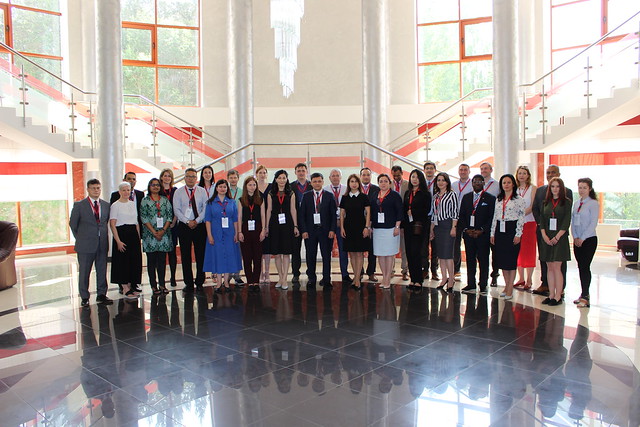
13 June 2019
ECAPI leaders wrap up milestone regional meeting
Co-hosted for the first time by the National Bank of the Republic of Belarus (NBRB), the meeting aimed to help develop strategies to resolve challenges faced by EECA countries and elevate their voices on key financial inclusion policy issues. Among those attending were representatives from the Central Bank of Armenia (CBA), NBRB, National Bank of Kazakhstan, Financial Regulatory Commission of Mongolia, Central Bank of the Russian Federation (CBR), National Bank of Tajikistan and Central Bank of Uzbekistan.
Deputy Chairman of the NBRB Board Sergei Kalechits opened the forum, reiterating the importance of the event and its aims. “Financial inclusion and financial services are a very important part of sustainable development,” he said.
Co-chair and CBR representative Nadezhda Prasolova closed the meeting by calling for continued commitment in achieving ECAPI’s goals.
“While we have made some ambitious plans, I am confident that we can achieve this, but we must remain vigilant and committed to achieving the deliverables we have set,” she said as she thanked co-hosts NBRB and AFI, as well as participants for all their hard work over the past three days.
Reflecting on the earlier sessions, AFI’s Head of Policy Programs and Regional Initiatives Eliki Boletawa said: “The region has seen incredible advancements in terms of financial access.”
“While usage and quality of financial services including financial literacy remains to be fully tackled, the EECA region’s countries have been characterized by specific traits and challenges, which require focused and tailored measures and solutions.”
Events kicked off on 11 June with the Experts Group on Financial Inclusion Policy (EGFIP) and discussions that focused on four policy areas: interoperable remittance regional system and facilitation of cross-border remittances; market conduct regulation and supervision; regional guidelines for financial education and impact measurement of financial education programs; and behavioral-based financial education programs.
Before concluding the day’s sessions, members approved the EGFIP charter and highlighted 16 priority areas, including 14 deliverables — policy knowledge products, case studies and policy papers – that are slated for completion either by December 2019 or 2020. A letter outlining progress made will be sent to member institutions.
Ahead of the main discussions, AFI’s Ali Ghiyazuddin Mohammad delivered a presentation on the various implementation activities of the Global FinTech Workplan. Afterwards, AFI’s Madhurantika Moulick gave a run-down of the network’s capacity building services, including the bi-annual Certified Expert in Financial Inclusion Policy (CEFI) course. Registration for CEFI, which is run in collaboration with the Frankfurt School of Financial & Management, is open until July 15, 2019.
Next on the ECAPI agenda was a training seminar run by AFI Public-Private Dialogue (PPD) partner, Mastercard on 12 June on approaches to enhance financial inclusion through digital financial services. Among the topics raised was the projection that more than 15 devices (including household devices) will be connected to the internet in the next few years, prompting a rise in the use of instant direct payments, such as for refrigerators that can order food items independently.
ECAPI was launched during AFI’s 2018 Global Policy Forum, which was held in Sochi, Russia. Founded by eight AFI member institutions, the seven in attendance plus the National Bank of Georgia, it is the youngest of five regional initiatives with the others covering Africa, Latin America and the Caribbean, the Arab region and the Pacific Islands.
NBRB joined AFI in May 2010 and is currently a principal member. It has made two Maya Declaration Targets, namely, including to increase the number of adults to 85 percent and improving financial literacy.
Move your mouse over the photo and click the arrows pointing left/right to flip through the gallery.



© Alliance for Financial Inclusion 2009-2025